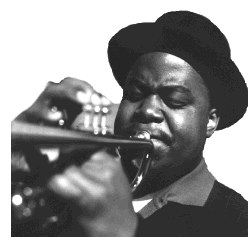|
Nicholas Payton Rocks the Victory |
 |
|
by Paul Klemperer
The Victory Grill on East 11th Street is recognized by growing numbers of Austinites as an historic club that links the present-day music scene to the city's musical heritage. This link was strengthened on April 19 when trumpeter Nicholas Payton put on two incredible shows. The music was steeped in bebop and soul jazz, and the sounds somehow felt intensely appropriate resonating off of the club's vintage decor.
The night began with Fred Sanders' trio, opening for both of Payton's shows. Every time I hear this group the members demonstrate an increasing sensitivity to each other's playing. They are developing the kind of telepathic synchronization and delicacy of touch that gives the piano trio a special place in jazz. Fred Sanders' sensitive touch, precision chord placement and tightly crafted phrasing create a wonderful texture which inspires bassist Edwin Livingston and drummer J.J. Johnson to an equally focused dialogue.
Sanders' composition, "Ones Of Wisdom," written for his grandparents, was particularly beautiful, built around a syncopated pattern reminiscent of the gentler side of McCoy Tyner. Livingston turned in an exceptional bass solo on this number, as well as some nice bowed solos later in the show.
Throughout the trio's set the audience was attentive and responsive. The mood at the Victory was unique, part concert and part party. The people were there to hear the music, but to hear it together, something that is fairly rare in Austin; concert settings tend to reinforce a polite and distant audience, while the bar scene often pits performers against an audience whose primary concern is talking, drinking or dancing. This was not the case that night.
The Nicholas Payton Quintet (with Tim Warfield on tenor sax, Anthony Wonsey on piano, Ruben Rogers on bass, and Adonis Rose on drums) opened with a funky soul jazz number harking back to Lee Morgan, immediately
Payton's ensemble is a group of all-stars, each capable of leading his own band. As Wonsey told me, they choose to play with Payton because of the high degree of musical satisfaction involved. It is a tight band which can burn or lay back, push the edge of emotional release and never lose the finely woven fabric of its collective sound. Payton himself has some of the purest, richest tones of any trumpet player today, coupled with an intricate melodic sense which can build to fiercely beautiful upper register explosions.
Many of the group's numbers were from their upcoming CD Payton's Place, scheduled for release in June. The tunes range from funky jazz which connect Payton to his New Orleans roots, to intricate hard bop classics by Freddie Hubbard and Wayne Shorter, to delicious and lush ballads. It's sure to be a recording that jazz lovers will want to add to their collection, and the next best thing to hearing Payton's very special magic live.
|
||
top | this issue | ADA home |
||
 bumping the energy level up several notches and eliciting sympathetic cries from the crowd. Payton was followed by a burning sax solo from Warfield. Someone yelled: "Play your horn! Play your horn!" This seemed to spur Warfield to further heights. Many local jazz players were in the audience, ears turned wide open, and there were constant exclamations of appreciation as well as groans of envy throughout the show. After the first number, Payton acknowledged the warm and vocal reception by saying: "It's great to be back in the South!"
bumping the energy level up several notches and eliciting sympathetic cries from the crowd. Payton was followed by a burning sax solo from Warfield. Someone yelled: "Play your horn! Play your horn!" This seemed to spur Warfield to further heights. Many local jazz players were in the audience, ears turned wide open, and there were constant exclamations of appreciation as well as groans of envy throughout the show. After the first number, Payton acknowledged the warm and vocal reception by saying: "It's great to be back in the South!"